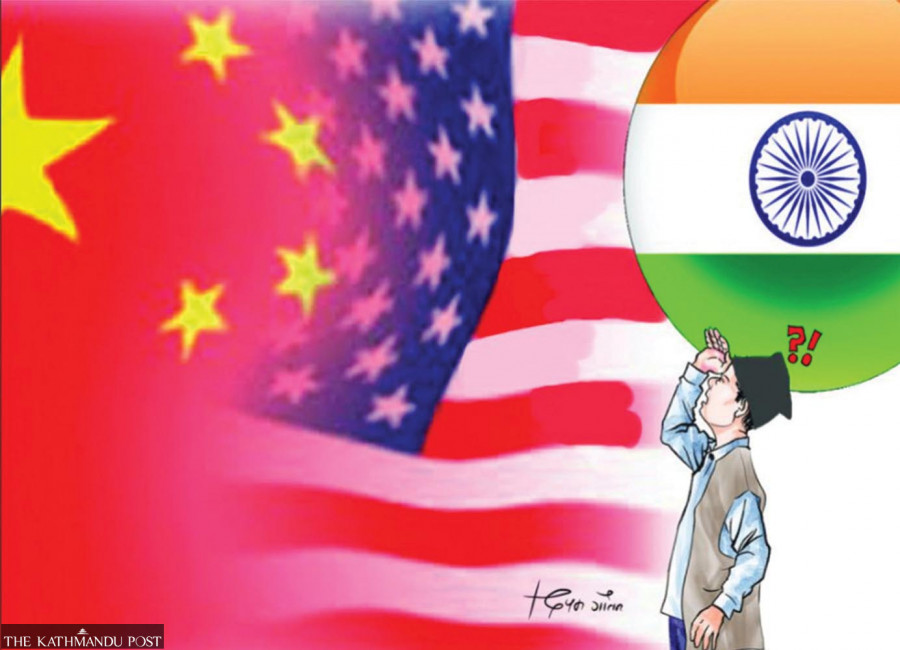Given that Nepal’s only two neighbours China and India are arch-rivals, the US seems equally concerned about happenings in Nepal.

The US, China and India have in recent times launched various strategies aimed at increasing or consolidating their influence in the world.
On March 15, Chinese President Xi Jinping attended the world political parties’ meeting organised by China where he unveiled the Global Civilization Initiative (GCI). Prior to this, he offered the idea of the Global Development Initiative (GDI) in 2021 at the United Nations General Assembly, and then the Global Security Initiative (GSI) in 2022 at the Boao Forum for Asia.
“Although each initiative targets specific global problem areas, these initiatives are important public good China has shared with the world in the new era,” said Wang Donghong, an associate professor in Marxism and Contemporary China Studies at Shaanxi Normal University. “This will inject a strong impetus into humanity’s modernization process and building a community with a shared future for mankind.”
While Nepal's northern neighbour China has been advocating numerous initiatives in the past few years, the southern neighbour India is also not behind. India launched global initiatives like the Indo-Pacific Oceans Initiative, the International Solar Alliance, and the Lifestyle for Environment.
Although the US Indo-Pacific Strategy (IPS) and the State Partnership Program (SPP) have become buzzwords, earlier US initiatives like the Blue Dot Network and the Trans-Pacific Programme are no longer in public debate.
“Major nations see this as their duty to not just provide welfare, security and representation for their citizens but also contribute to addressing regional and global challenges,” said Swaran Singh, a professor of Diplomacy and Disarmament at Centre for International Politics, Jawaharlal Nehru University, New Delhi.
Zhiqun Zhu, a professor of political science and international relations at Bucknell University, US, however, said a world power country and a country aspiring to become a world power are taking various programmes in the name of human development in their attempts to consolidate their influence abroad.
“I think the world has entered a multipolar stage with several powers vying for global influence. The United States is busy competing with and containing China as its global leadership has declined,”
Professor Zhiqun sees this as normal as the US global leadership continues to decline and US-China competition intensifies. “Other powers may feel compelled to step in to offer alternative ways to manage world affairs,” Professor Zhinqun said.
Is the goal of these projects for the “development and welfare of the human race” by major powers merely a smokescreen for their ulterior motives?
Professor Zhinqun said, when it comes to the similarities, all the initiatives are purportedly aimed at building a better, safer and more prosperous world for everyone. “A better approach is for these powers to work together and coordinate their efforts to achieve common objectives.”
Bhaskar Koirala, an expert in international relations, says it might be challenging for Nepal to balance itself. “It will be difficult for Nepal to navigate the many big and sometimes diametrically opposed geopolitical initiatives that are being floated by the US, China, India—all countries Nepal has friendly relations with.”
Historically, India in particular has been very sensitive about Kathmandu’s diplomacy that impinges on India’s security concerns and such a course should be avoided as much as possible, added Koirala.
As such, any path that Nepal chooses should explicitly avoid moving in ways that adversely harm the overarching security concerns of Nepal’s diplomatic partners.
Koirala further adds, “It is not imprudent for Nepal to take time to thoroughly evaluate what the implications of her foreign policy choices will be; to not act impatiently and even, as a matter of strategy, focus instead on purely domestic concerns and abjure from making any sudden and dramatic shifts in policy that may trigger more instability internally and externally.”
According to former ambassador Shambhu Ram Simkhada, when the three nations that are significant to Nepal are introducing new initiatives to strengthen their positions as global leaders, Nepal must first be clear in its internal policy.
“When the countries are forging various new initiatives, Nepal needs to make explicit in its foreign policy and be clear whom should we cooperate with, and on what issues,” Shimkhada said. “If there are some areas where we cannot cooperate then it must be made clear why we cannot go together.”
Wang Zong, a professor and Nepal expert at Yunnan University in China, also believes that Nepal should prioritise its own interests.
“As Nepal adheres to the foreign policy of balance, it would be ideal for the country to carefully weigh which initiatives of which countries will be most beneficial to it,” professor Wang said.












